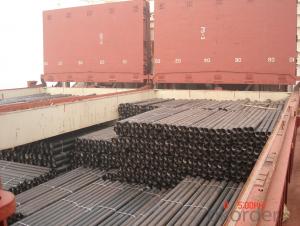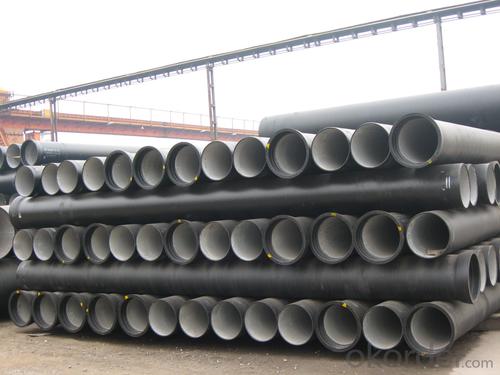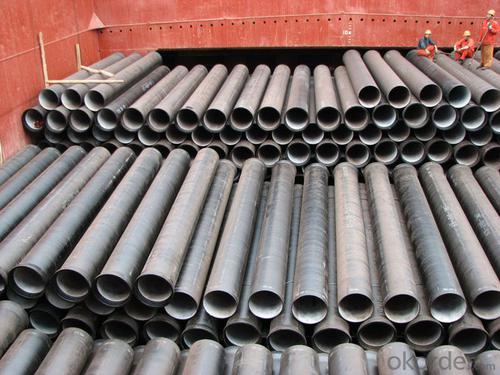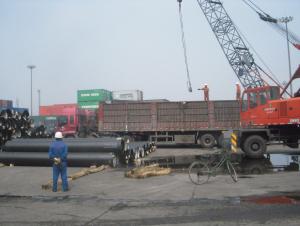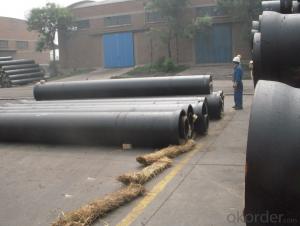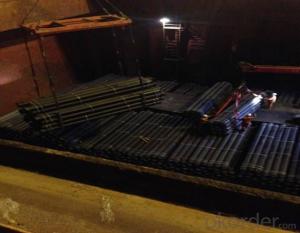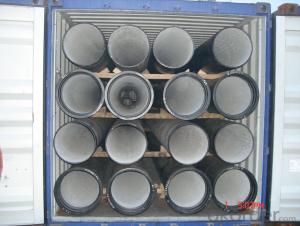DUCTILE IRON PIPE DN1000 K8
- Loading Port:
- China Main Port
- Payment Terms:
- TT OR LC
- Min Order Qty:
- -
- Supply Capability:
- -
OKorder Service Pledge
OKorder Financial Service
You Might Also Like
Specification:
1) The standard of pipe: ISO2531:1998, K9
2) Effective length: 6m
3) Inner cement line: Portland cement line as per ISO4179
4) Zinc coating: at least 130g/m2 as per ISO8179
5) Bitumen painting: at least 70um as per ISO8179
6) With 100% quantity of NBR ring, or SBR ring, or EPDM ring as per ISO4633
7) DN80mm-800mm
8) High strength, lighter than grey iron, good corrosion resistance, no furring, small flow resistance, easy fixing, long life tome about 100 yeas
9) Produced by Hangzhou chunfeng machine
10) Checked by automatic inspection equipment
11) Composition:
Chemical composition | | | | |||
Chemical composition | Ductile Cast Iron Pipe (%) | Grey iron pipe (%) | Steel pipe (%) | | | |
C | 3.5-4.0 | 3.2-3.8 | 0.1-0.2 | | | |
Si | 1.9-2.6 | 1.4-2.2 | 0.15-0.4 | | | |
Mn | 0.15-0.45 | 0.4-0.6 | 0.3-0.6 | | | |
P | ≤0.06 | ≤0.3 | 0.02-0.03 | | | |
S | ≤0.02 | ≤0.1 | 0.02-0.03 | | | |
Mg | 0.03-0.06 |
|
| | | |
12) Feature:
Mechanical properties | | | | |||
| Ductile Cast Iron Pipe | Grey Iron Pipe | Steel Pipe | | | |
Tensile Strength(Mpa) | ≥420 | 150-260 | ≥400 | | | |
Yield Strength(Mpa) | ≥300 | No Confirmation | No Confirmation | | | |
Bending Strength(Mpa) | ≥590 | 200-360 | ≥400 | | | |
Elongation (%) | ≥10 | Neglected | ≥18 | | | |
Brinell Hardness(HBS) | ≤230 | ≤230 | About 140 | | | |
13) T type mechanical joint
14) Packing: in bulk or container
- Q: What are the lubricants for the installation of ductile iron pipes for tap water?
- When choosing lubricant, it is necessary to consider the movement of friction pairs, materials, surface roughness, working environment and working conditions, as well as the performance of lubricants. In mechanical equipment, lubricants are mostly distributed by lubrication to the parts that need lubrication.
- Q: Can ductile iron pipes be used for geothermal systems?
- Yes, ductile iron pipes can be used for geothermal systems. Ductile iron pipes have excellent strength and durability, making them suitable for handling the high temperatures and pressures typically encountered in geothermal systems. Their corrosion resistance and flexibility also make them a reliable choice for transporting geothermal fluid efficiently.
- Q: How do ductile iron pipes handle extreme temperatures?
- Ductile iron pipes, known also as cast iron pipes, possess the ability to effectively handle extreme temperatures. The material composition of ductile iron enables it to endure both high and low temperatures without experiencing significant damage or degradation. When exposed to high temperatures, ductile iron pipes demonstrate exceptional thermal resistance, rendering them suitable for applications involving the transportation of hot liquids or gases. The high melting point of ductile iron, ranging from 2060°C to 2200°C, guarantees that the pipes can withstand extreme heat without melting or distorting. Consequently, these pipes are ideal for utilization in industries such as oil and gas, steam distribution, and high-temperature water supply systems. Likewise, ductile iron pipes exhibit satisfactory performance in low-temperature environments. They possess a low coefficient of thermal expansion, thereby enabling them to endure the expansion and contraction that occurs during temperature fluctuations without cracking or fracturing. This quality makes them appropriate for use in cold climates or in applications involving the transportation of chilled liquids or gases. Furthermore, ductile iron pipes possess excellent thermal conductivity, allowing them to efficiently dissipate heat. This characteristic proves particularly significant in high-temperature applications where effective heat transfer is vital to prevent damage to the pipes or the materials being transported. In conclusion, ductile iron pipes effectively handle extreme temperatures due to their high melting point, low coefficient of thermal expansion, and exceptional thermal conductivity. These attributes establish them as a dependable choice for various applications involving extreme temperature conditions.
- Q: Can ductile iron pipes be used in areas with high levels of hydrogen sulfide gas?
- Ductile iron pipes can generally be used in areas with high levels of hydrogen sulfide gas, but it is important to consider certain factors before making a decision. Hydrogen sulfide gas is corrosive and can potentially cause damage to metal pipes over time. While ductile iron is known for its durability and corrosion resistance, prolonged exposure to high levels of hydrogen sulfide gas can still lead to corrosion and deterioration. To mitigate the risks associated with hydrogen sulfide gas, it is advisable to assess the specific conditions of the area beforehand. This includes conducting a comprehensive analysis of the hydrogen sulfide gas concentration, pH levels, temperature, and other factors that may influence corrosion. Consulting with experts or engineering professionals who specialize in corrosion control can provide valuable insights and guidance. In some cases, additional measures may be necessary to protect ductile iron pipes. Coating the interior and exterior surfaces of the pipes with protective materials, such as epoxy or polyethylene, can provide an extra layer of defense against corrosion. Alternatively, cathodic protection systems can be employed to protect the pipes by applying a low voltage electrical current that mitigates the corrosion process. Ultimately, the decision to use ductile iron pipes in areas with high levels of hydrogen sulfide gas should be based on a thorough understanding of the specific conditions and implementing appropriate corrosion prevention measures. Regular monitoring and maintenance should also be conducted to ensure the pipes are functioning optimally and to address any potential issues before they escalate.
- Q: Are ductile iron pipes resistant to chemical attacks?
- Generally, ductile iron pipes exhibit resistance to chemical attacks. The high corrosion resistance of ductile iron makes it suitable for a wide range of applications, including water and wastewater systems. To further enhance their resistance to chemical attacks, ductile iron pipes are commonly lined with a protective coating such as cement mortar or epoxy. This lining acts as a barrier between the pipe material and corrosive substances, preventing any degradation of the iron. However, it is important to consider that the level of resistance may vary depending on the specific chemical being transported, as well as the concentration and temperature of the solution. Therefore, it is advisable to seek the guidance of experts or engineers to ensure the appropriateness of ductile iron pipes for specific chemical environments.
- Q: Are ductile iron pipes resistant to abrasion?
- Indeed, abrasion is no match for ductile iron pipes. Ductile iron, a form of cast iron fortified with magnesium, undergoes this treatment to enhance its robustness and malleability. Consequently, it becomes exceptionally resistant to deterioration, including abrasion. These pipes find widespread use in scenarios where they encounter abrasive substances like sand, gravel, and other particles during fluid transportation. The material's remarkable capacity to endure abrasion guarantees its endurance and dependability across diverse sectors, ranging from water distribution and sewer systems to industrial pipelines.
- Q: How does ductile iron pipe perform in areas with high ground movement?
- Areas with high ground movement are well-suited for the exceptional performance of ductile iron pipe. Its unique properties and design ensure a high resistance to deformation and damage caused by ground shifting, settling, or seismic activities. The material's ductility enables it to withstand significant stress and strain without fracturing or breaking, setting it apart from rigid materials like cast iron or PVC. Ductile iron pipe's ability to flex and absorb ground movement prevents catastrophic failures and guarantees the integrity of the pipeline system. Moreover, ductile iron pipe is manufactured with various joint configurations that enhance its performance in areas with high ground movement. Flexible joints, like restrained or mechanical joints, effectively accommodate movement by allowing limited rotation and translation, minimizing the risk of pipe separation or joint failure. Additionally, the robust construction of ductile iron pipe, featuring a thick wall thickness and high tensile strength, offers added protection against ground movement. This strength enables the pipe to withstand external loads and forces induced by the ground, maintaining its structural integrity and preventing deformation. To summarize, ductile iron pipe is an excellent choice for areas with high ground movement due to its exceptional ductility, flexible joints, and robust construction. Its ability to absorb ground movement while ensuring the functionality and safety of the pipeline system establishes it as a reliable and durable option in challenging environments.
- Q: DN1800 can the length of ductile iron pipes be several meters? What is the total weight?
- Ductile cast iron pipe after annealing, the microstructure is ferrite and pearlite, good mechanical properties, excellent corrosion resistance, good ductility, good sealing effect, simple installation, mainly for municipal, industrial and mining enterprises, water supply, gas, oil etc..
- Q: Can ductile iron pipe be used for pump stations?
- Yes, ductile iron pipe can be used for pump stations. Ductile iron pipe is known for its durability and strength, making it suitable for high-pressure and heavy-duty applications such as pump stations.
- Q: What pipe can be used to replace the cast iron pipe in the water supply? Thank you
- According to the casting method, it is divided into continuous cast iron pipe and centrifugal cast iron pipe, in which the centrifugal cast iron pipe is divided into sand mould and metal type two kinds. Divided into gray cast iron pipe and nodular cast iron pipe according to different material. According to the interface form, it is divided into flexible interface, flange interface, self anchored interface, rigid interface and so on. Among them, the flexible iron pipes rubber sealing ring; flange interface cast iron pipe flange fixed in the rubber pad, the flange gasket sealing; rigid interface cast iron pipe socket is large, straight pipe is inserted, sealed with cement, this technology has been basically eliminated.
Send your message to us
DUCTILE IRON PIPE DN1000 K8
- Loading Port:
- China Main Port
- Payment Terms:
- TT OR LC
- Min Order Qty:
- -
- Supply Capability:
- -
OKorder Service Pledge
OKorder Financial Service
Similar products
Hot products
Hot Searches
Related keywords


